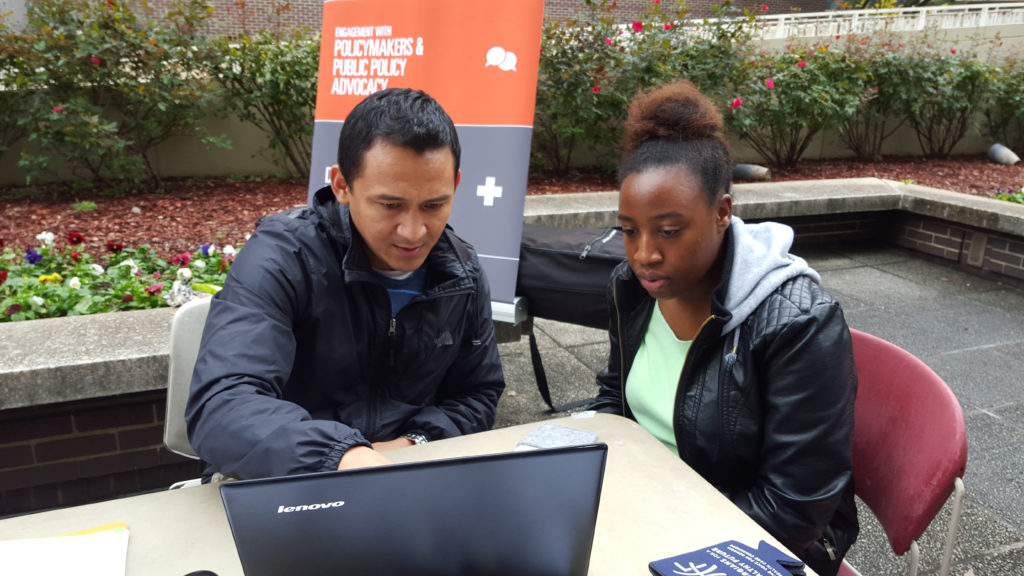As the dust settles in the wake of President Donald Trump’s “big, beautiful bill,” — the massive spending cut and tax break package signed into law early this month —…
Blog
Legislative update: Week 11
| The GHF team loves bringing you these weekly legislative updates, and you have told us that you enjoy reading them! Our team works hard to deliver this service to you in a complete and accurate way every week of Georgia’s legislative session. If you rely on these updates to keep you connected to the health happenings under the Gold Dome, please consider supporting our work with a donation today. Thank you very much! |
In this week’s update:

- Action alert: Ask Senators to vote “YES” for HB 404 in support of safe, healthy housing!
- Mental health bill’s future is uncertain
- FY24 budget updates
- Legislation on the move: vaping, state-based marketplace
- GHF’s got you covered this session!
ACTION ALERT: URGE YOUR SENATORS TO VOTE “YES” ON HB 404
Senate to vote on healthy housing bill!

Last week, the Senate Finance committee heard and approved HB 404. (GHF testified in support!) The Senate Rules committee followed suit and scheduled HB 404 for a Senate vote today or Wednesday. Please contact your Senator now and ask that they vote “Yes!”.
HB 404, the Safe at Home Act, would help families stay safely and more stably housed. Decent, safe and stable housing is fundamental to keeping children and adults healthy, able to make ends meet, continue working, allow children to succeed at school, and so much more.
In it’s current form, HB 404:
- Requires that rental properties are “fit for human habitation”
- Includes cooling as a utility that cannot be shut off prior to an eviction action
- Prohibits landlords from requiring a security deposit that is more than two months’ rent.
- Allows a tenant three business days (following a written notice) to pay owed monies prior to an eviction proceeding being filed. (This is called a “right to cure”)
Click here to find your state Senator. (Tip: they will be the second-to-last official listed on the page.) Call to ask them to support HB 404 when it comes up for a vote!
If you don’t know what to say when you call, use this example: “My name is ________. I live and vote in your district. Please vote YES on House Bill 404 when it comes to the Senate for a vote. This bill would provide fair housing protections to families, including by making sure all rental units are safe and healthy. This is especially important to help keep Georgia kids in school, out of foster care, and healthy in their communities. Thank you!”
(Want to know more about how housing & health are connected? Take a look at GHF’s Healthy Housing page.)
MENTAL HEALTH BILL IN JEOPARDY
Mental health reform bill has stalled in the final days of session

This year’s mental health reform bill, HB 520, is facing an uncertain future. Like last year’s mental health bill, HB 520 has been the subject of misinformation and stigma. As a result, it has not yet been approved by the Senate Health & Human Services committee–a necessary step before Sine Die.
The mental health reform bill, HB 520, is facing an uncertain future. Last Wednesday, the Senate Health and Human Services committee heard HB 520 once again. During the meeting Chairman Watson reviewed changes made to the bill. These changes include:
- Removing the ban on step-therapy for individuals diagnosed with serious mental illness which would have eased access to critical medications for certain mental health conditions
- Requiring the definition of “serious mental illness” to be approved by the legislature
- Removing the protection that would have barred local housing authorities from rejecting an applicant who has a criminal record in an effort to remove barriers to housing
- Removing the directive to study barriers to mental health licensing
- Narrowing the loan forgiveness program for mental health providers
- Removing the directive to DCH to apply for a waiver that would have allowed Medicaid to pay for social supports such as nutrition and housing for Medicaid members
The committee ultimately did not vote on the bill. Legislation that was not approved by a Senate committee by last Wednesday are unlikely to make it to the Senate floor before Sine Die. However, the Senate could suspend its rules and put HB 520 up for a vote.
Budget Updates

FY24 Budget
Last week the Senate passed its version of the FY24 budget. The Senate begins with the House version of the budget and makes changes according to its own priorities. Once the Senate passes the budget, it goes back to the House to vote to “agree” or “disagree” to the Senate’s version. On Thursday, the House voted to disagree, prompting the House and Senate to appoint a conference committee to hammer out their remaining differences. In today’s legislative update, we’ll highlight some of the changes the Senate made to the health-related accounts of House budget.
You can read our previous overviews of the Governor’s and state agencies’ FY 24 budget here and the changes the House made here.
- Department of Behavioral Health and Developmental Disabilities
- Increase funds for 500 COMP and NOW waiver slots for a total of $9.4 million for the new waivers
- The House budget requested $8.1 million for 375 new waiver slots
- The Governor’s budget requested $4.2 million for 250 new waiver slots
- NOW & COMP waivers allow people with IDD to receive community-based services. Even with these new slots, 7,000 Georgians with IDD are still on the waiting list for a waiver
- Remove $2.7 million for the Georgia Consumer Mental Health Network for peer support services and utilize existing funds to maintain current funding levels for GCMHN
- The House added this funding
- This funding was not included in the Governor’s budget
- Remove $300,000 increase in funds to hire staff to support the administration of the federal opioid settlement funds
- The House added this funding
- The funding was not included in the Governor’s budget
- The federal opioid settlement provides Georgia with hundreds of millions of dollars from companies involved in the distribution and sales of prescription opioids. If leveraged correctly, these funds can help the state prevent opioid overdose deaths and prioritize prevention programs
- Increase funds for 500 COMP and NOW waiver slots for a total of $9.4 million for the new waivers
- Department of Community Health
- Add $1 million in funding for a remote maternal/fetal health monitoring program for Medicaid eligible high-risk pregnant persons
- These funds were not included in the House or Governor’s budgets
- This funding is tied to SB 106, which establishes the remote maternal/fetal monitoring program
- Reduced start-up grants for federally run qualified health centers (FQHCs) to $500,000 for 2 FQHCs
- The House included $750,000 for 3 FQHCs
- These funds were not included in the Governor’s budget
- The House funding would go towards establishing a new primary care clinic in Union City, a school-based health center in Emanuel country, and a behavioral health expansion at Christ Community Health Clinic in Augusta. It is not clear in the Senate budget which FQHCs would be funded
- Maintain $2.7 million to provide dental coverage for adults on Medicaid
- This funding was added by the House
- This funding was not included in the Governor’s budget
- Currently, Medicaid only covers emergency services for adults on Medicaid. Allowing Medicaid to reimburse for preventive and routine dental services will allow more low-income Georgians to access much needed oral health care
- Maintain funding to remove the 5-year waiting period for pregnant women and children who are lawful permanent residents
- This funding was not included in the Governor’s budget, it was added by the House
- Currently, immigrants to Georgia must be lawful permanent residents for 5 years before becoming eligible to apply for Medicaid, even when they meet all of the normal eligibility requirements. Removing this waiting period means that immigrants that are legally in the state will be able to access quality health care through the state’s Medicaid program
- Maintain $19 million to bring certain primary care and OBGYN Medicaid reimbursement codes up to 2021 Medicare levels
- This funding was not included in the Governor’s budget, it was added by the House
- Traditionally, MMedicaid reimburses at a lower rate than Medicare, which means that providers have less of an incentive to see Medicaid patients. By bringing up reimbursement rates to Medicare levels, providers will receive more money for seeing Medicaid patients. The increased rate incentivizes more providers to take Medicaid and, thus, improve access for Medicaid members
- Add $1 million in funding for a remote maternal/fetal health monitoring program for Medicaid eligible high-risk pregnant persons
- Department of Human Services
- Maintain $11 million and add $22 million for a total of $32.7 million to support an additional 450 caseworkers, 75 supervisors, and 1 district manager for Medicaid redeterminations during the Medicaid unwinding and make their positions permanent
- The House budget included $11 million in the FY23 budget to make the 300 eligibility caseworker positions permanent
- The Governor’s budget requested $3.2 million for an additional 300 caseworkers
- Starting April 1, DFCS will begin Medicaid redeterminations for almost all 2.7 million Medicaid members. These additional caseworkers are critical to this massive undertaking and to reducing the number of Georgians who lose their Medicaid coverage due to administrative errors
- Maintain $11 million and add $22 million for a total of $32.7 million to support an additional 450 caseworkers, 75 supervisors, and 1 district manager for Medicaid redeterminations during the Medicaid unwinding and make their positions permanent
- Department of Public Health
- Maintain $1.7 million for a pilot home visiting program for at-risk and rural communities during pregnancy and early childhood to improve birth outcomes, reduce pre-term births, and decrease infant and maternal mortality
- The Governor’s budget did not include this funding, it was added by the House
- Maintain $1.7 million for a pilot home visiting program for at-risk and rural communities during pregnancy and early childhood to improve birth outcomes, reduce pre-term births, and decrease infant and maternal mortality
LEGISLATION ON THE MOVE
| Upcoming for this week: Today and Wednesday are the final two days of the 2023 legislative session. The last day of the legislative session is called “Sine Die,” which means “without any future date being designated.” Today and Sine Die are both likely to be long, rushed days at the Capitol. Bills and budget changs will move quickly between now and midnight on Wednesday so the information below is only as current as the timestamp on this email. Follow GHF and #gapol on social media for the latest updates! Next Monday, we’ll send a legislative update recapping what did and didn’t get accomplished in this year’s session. |
Bill banning gender-affirming surgery for minors signed into law

After the Senate approved SB 140 last Tuesday, the Governor quickly signed it into law on Thursday.
This bill will ban certain kinds of gender-affirming health care for minors–specifically hormone replacement therapy (HRT) for youth who have not started HRT prior to July 1, 2023 and gender-affirming surgeries. It also criminalizes medical providers for administering gender-affirming care in line with established standards of care.
GHF opposed SB 140 because of the negative impacts it will have the mental health & well-being of transgender children and youth. Research shows that gender-affirming health care greatly improves the mental health and overall well-being of gender-diverse, transgender, and nonbinary children and adolescents.
Click here for a statement from our partners at Georgia Equality following the bill’s signing.If you or someone you know may be impacted by this bill, support and resources are available at PFLAG’s Georgia-specific page and through TransParent.
State-based marketplace bill goes to the Governor

The House approved SB 65 on Thursday and it now goes to the Governor for his signature.
SB 65 would move Georgia’s health insurance marketplace from healthcare.gov (which is managed and run by the federal government) to a state-based marketplace (SBM). Ahead of this week’s vote, GHF and partner groups encouraged the legislature and the Department of Insurance to maintain and grow funding for local consumer outreach and assistance. This kind of investment would prevent coverage losses during the switch from healthcare.gov to a Georgia-led marketplace. It would also set the SBM up for the greatest success in reaching eligible but uninsured Georgians.
Bill on vaping regulations approved

SB 47 passed the House and now goes to the Governor for his signature.
Sponsored by Sen. Chuck Hufstetler, SB 47 would update the Indoor Air Quality Act.The changes would prohibit vaping in the same areas that smoking is currently banned in Georgia. Georgia’s smoking ban was put in place in 2005, well before vaping became popular.
Seventeen percent (17%) of Georgia high schoolers report vaping. Because vaping products include nicotine, vaping can lead to addiction (just like cigarettes). It may also lead to lung disease.
Bill to lower prescription drug costs stalls

HB 343 was heard in the Senate Health and Human Services Committee last Wednesday, but failed to advance after a close 5-6 vote.
Introduced by Representative Mark Newton, HB 343 would change requirements for pharmacy benefits managers (PBMs). The Lowering Prescription Drug Costs for Patients Act would require PBMs to pass the discounts receive from drug makers down to consumers, possibly lowering out of pocket prescription prices. The bill originally required that 80% of PBM savings to be passed to consumers, but the rate was lowered to 50% before it was approved by the House.
Vote delayed for Consumer Access to Contracted Healthcare (CATCH) Act

SB 20 was scheduled for a House vote last week, but has since been postponed. It is not clear if SB 20 will get a vote before Sine Die.
This bill was introduced by Sen. Kay Kirkpatrick and is titled the Consumer Access to Contracted Healthcare (CATCH) Act. The CATCH Act aimed to set network adequacy standards for insurers and provide consumers with protections when they are forced to go out of a health plan’s network of providers to access timely care. The bill was changed by the Senate Insurance committee, which removed the consumer protections and did not add in measurable network adequacy standards to which insurance companies can be held accountable.
GHF has you covered!
Stay up-to-date with the legislative session

GHF will be monitoring legislative activity on a number of critical consumer health care topics. Along with our weekly legislative updates and timely analysis of bills, here are tools to help you stay in touch with health policy under the Gold Dome.
- Sign up for the Georgia Health Action Network (GHAN) to receive action alerts that let you know when there are opportunities for advocacy and action
- Remind yourself how the legislative process works
- Catch up with our 2023-2024 policy priorities
- Track health-related legislation on GHF’s website
- Find or contact your legislators on our website
- Write a letter to the editor about a legislative issue that’s important to you
Stay Connected
GHF In The News
Archive
- July 2025
- June 2025
- May 2025
- April 2025
- March 2025
- February 2025
- January 2025
- October 2024
- May 2024
- April 2024
- March 2024
- February 2024
- January 2024
- December 2023
- October 2023
- July 2023
- April 2023
- March 2023
- February 2023
- January 2023
- December 2022
- October 2022
- September 2022
- August 2022
- June 2022
- April 2022
- March 2022
- February 2022
- January 2022
- December 2021
- November 2021
- October 2021
- September 2021
- August 2021
- June 2021
- May 2021
- April 2021
- March 2021
- February 2021
- January 2021
- December 2020
- November 2020
- October 2020
- September 2020
- July 2020
- June 2020
- May 2020
- April 2020
- March 2020
- February 2020
- January 2020
- December 2019
- November 2019
- October 2019
- September 2019
- August 2019
- July 2019
- May 2019
- April 2019
- March 2019
- February 2019
- January 2019
- December 2018
- November 2018
- October 2018
- September 2018
- August 2018
- July 2018
- June 2018
- May 2018
- April 2018
- March 2018
- February 2018
- January 2018
- December 2017
- November 2017
- October 2017
- September 2017
- August 2017
- July 2017
- June 2017
- May 2017
- April 2017
- March 2017
- February 2017
- January 2017
- December 2016
- November 2016
- October 2016
- September 2016
- August 2016
- July 2016
- June 2016
- May 2016
- April 2016
- March 2016
- February 2016
- January 2016
- December 2015
- November 2015
- October 2015
- September 2015
- August 2015
- July 2015
- June 2015
- May 2015
- April 2015
- March 2015
- February 2015
- January 2015
- December 2014
- November 2014
- October 2014
- September 2014
- July 2014
- May 2014
- March 2014
- January 2014
- December 2013
- October 2013
- September 2013
- August 2013
- July 2013
- June 2013
- May 2013
- April 2013
- March 2013
- February 2013
- January 2013
- November 2012
- October 2012
- September 2012
- July 2012
- June 2012
- May 2012
- April 2012
- March 2012
- February 2012
- January 2012
- December 2011
- November 2011
- October 2011
- September 2011
- August 2011
- July 2011
- June 2011
- April 2011
- March 2011
- February 2011
- January 2011
- December 2010
- November 2010
- October 2010
- September 2010
- August 2010
- July 2010
- June 2010
- May 2010
- April 2010
- March 2010
- February 2010
- January 2010
- December 2009
- November 2009
- October 2009